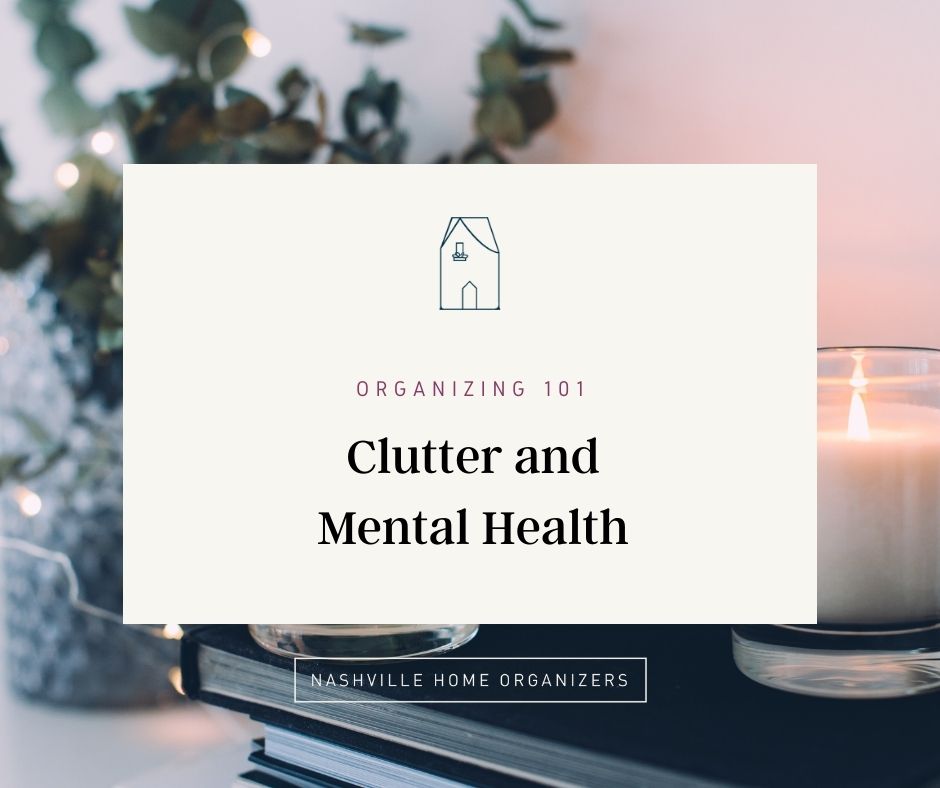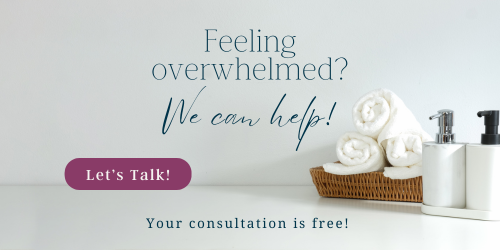|
October is World Mental Health Month, so we thought we’d spend a little time discussing how clutter in our homes could affect our mental health. Have you ever walked into your home or a space in your home that was overflowing with stuff, and it automatically made your stress level rise? I have! All you can see is a to-do list; you don’t want to do it, you don’t know how to do it, and it's too overwhelming. Listen to this testimony from one of our clients: “Our family recently experienced trauma, which compounded the messiness in our home because we haven't had time to clean up. The counseling offices we've spent time in are so calming and made me realize the need to make our home less chaotic and more organized/peaceful.” THIS!!! This is what makes my job rewarding. We are helping real people with real-life hardships. When people experience a tragedy, their homes are the last thing they have the time to care for. They don’t have the capacity to go through the mail, keep up with the laundry, or tidy up the messes. They are just trying to get out of bed, get through the day, or even eat a meal. Here are a few ways that clutter in our homes can affect our mental health:Increased Stress and AnxietyClutter can create a sense of chaos and overwhelm, leading to increased stress levels. It can trigger feelings of helplessness. Have you ever been stressed out when you are trying to leave the house and can’t find your shoes or keys? The lack of organization in a cluttered space can create a sense of uncertainty and make it difficult to find what we need when we need it. Reduced Focus and ProductivityA cluttered environment can be distracting, making it harder to concentrate and be productive. The presence of too many items vying for attention can make it challenging to prioritize tasks and stay on track. The brain has to work harder to filter out irrelevant information, which can lead to decreased cognitive performance and productivity. Personally, I have a hard time getting work done when I know there is clutter staring me in the face. Impaired Mental RestA cluttered bedroom or living space can disrupt your ability to unwind. The visual and physical clutter in our environment can make it difficult for our brains to relax and focus, contributing to a constant feeling of unease. This can really snowball into more stress. When we don’t get the rest we need, we don’t have energy to deal with the stress we face! Decision-Making ChallengesWhen surrounded by clutter, making decisions can become more difficult. The abundance of choices and stimuli can lead to decision fatigue, where even simple choices become overwhelming. Self-Esteem and ShameLiving in a cluttered space can lead to feelings of embarrassment or shame, particularly when you have visitors. We hear from many clients who are too embarrassed to have company over because of the disorganization in their homes. Reducing visual clutter can help improve your mood and mental well-being. Creating an organized, visually pleasing environment can lead to a sense of calm, increase your ability to focus, and contribute to a more positive overall outlook. If clutter consistently affects your mental well-being, it might be helpful to declutter and organize your environment. Tips For Organizing When You Feel Like You Can’tOne of the hardest parts about any project is starting. But there are a few ways that you can motivate yourself, even on your hardest days.
1. Set aside time to focus. While 30 minutes a day would definitely make a big difference in each home, we know you probably don’t have the time or mental ability to block off time daily. Try 20 minutes a week or an hour every couple of weeks. Using a timer can help you stay focused and know when to stop. 2. Set yourself up for success! Promote your productivity by serving your senses. Try these tips:
3. Get started! While we do have recommendations for a full decluttering project, this may not be the time for you to make a bunch of decisions. Keep it simple.
If you don’t have the capacity to take it on, reach out for help! Ask a trusted friend to help you or hire a professional. Home organizers come with no judgment and a desire to create that stress-free environment you seek. Do you know someone who could benefit from the gift of an organized home? We offer gift certificates! Contact us today!
0 Comments
Leave a Reply. |
NASHVILLE HOME ORGANIZERS
HoursM-F: 9am - 5pm
Telephone615.497.2936
|
|
©
Nashville Home Organizers - All Rights Reserved


 RSS Feed
RSS Feed
